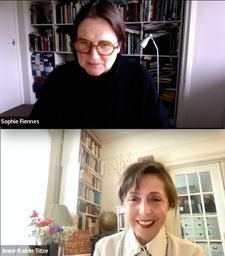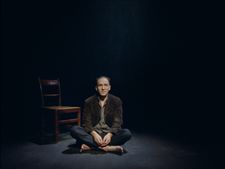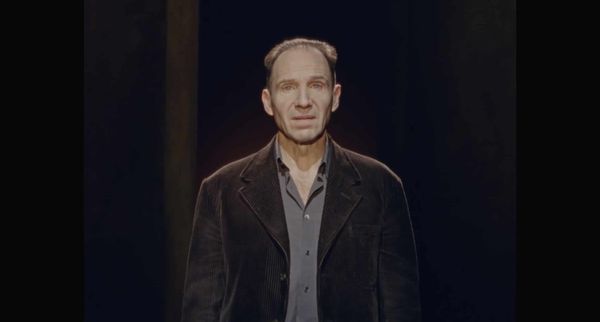 |
| Sophie Fiennes on Ralph Fiennes starring and staging T.S. Eliot's Four Quartets: “The thing that Ralph does brilliantly is the distribution in the space of the ideas. How he places them.” |
In the second instalment with Sophie Fiennes we discuss her superb and faithful capturing of Ralph Fiennes’ stage production of T.S. Eliot’s Four Quartets (cinematography by Mike Eley, production design by Hildegard Bechtler, lighting by Tim Lutkin), Helen Gardner’s The Art Of T.S. Eliot, Grace Jones: Bloodlight And Bami, Samuel Beckett, Andrei Tarkovsky’s Stalker, François Truffaut’s The 400 Blows, Elizabethan and Metaphysical poetry.
Within days of speaking with Sophie, by chance every film I happened to watch contained a quote from the Nobel Prize-winning poet. In Boris Sagal’s apocalyptic The Omega Man (1971), Charlton Heston as Robert Neville quotes from Eliot’s The Waste Land and 50 years later in Benediction (2021), directed by Terence Davies, on First World War poet Siegfried Sassoon (played by Jack Lowden), Eliot is commented on twice. The same weekend, Ed Bahlman’s signed program from a 1996 production of The Waste Land with Fiona Shaw, directed by Deborah Warner, tumbled into my hands out of a book moved for spring cleaning.
A product of the Second World War, Eliot’s four-part poem reads as timely as ever. Ralph Fiennes in his staging gives us light, a table, two chairs; he is barefoot and breathing. Four Quartets yields wonderfully thoughtful camera movements and angles and also takes us out of the theatre space to breathe the same landscapes Eliot so unmatchedly described in Burnt Norton, East Coker, The Dry Salvages, and Little Gidding. He was always already there. “And there is only the dance” we catch and see a wall in a garden in the fall. “Only through time time is conquered” says the voice and speaks of “this twittering world” to provide the relevance to the present with an extra prescient punchline. Before anything in Burnt Norton, Ralph Fiennes sits in silence, then dives into “Time present and time past” which “are both perhaps present in time future”.
Earth Day 2023 just came and passed this weekend and the deaths of air, earth, water and fire Eliot evokes are more threatening than ever. The Fiennes siblings with this film tote a precious gift of T.S. Eliot’s wisdom, presented with fire and a rose.
From London, Sophie Fiennes joined me on Zoom for an in-depth conversation on T.S. Eliot's Four Quartets.
Anne-Katrin Titze: Hello Sophie! I love TS Eliot to start with, and it was such a pleasure to see this film. “Time present and time past/ Are both perhaps present in time future,/ And time future contained in time past.” Isn’t this also very much connected to filmmaking?
Sophie Fiennes: It is and it’s certainly connected to documentary making because you’re making this document of a present moment that becomes a past moment and will exist in the future. So this wrestle with time does of course resonate with filmmakers. And it certainly resonates with me and I possibly wouldn’t have been as interested in becoming a filmmaker if I hadn’t had become acquainted with that poem at a very early age.
AKT: Tell me about that!
SF: Because my mother was a writer and she loved Eliot - she even called her dog Eliot at some point - so we grew up where this was very much there. We had the vinyl recording of Eliot reading it. Actually I got more into it in my twenties. It’s a poem that enters your being. Because it is so intimate. Actually the very process of reading poems is an intimate one because you picture it in your head and, as Eliot says, you read in silence.
AKT: It’s one of those miracles of art for me because every time I read Four Quartets I discover new things and doubt my own past readings. How could I have missed this part or that?
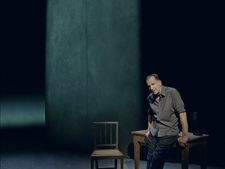 |
| Sophie Fiennes: “I have a particular interest in what is called cinematic staging.” |
SF: That’s poetry, isn’t it? Poetry is an open system, a bit like filmmaking. It has cuts, it has breaks. It doesn’t pretend to have the kind of cohesion of prose. It will feel different according to when you approach it, because you’ll bring something of yourself in these re-readings.
AKT: Even the time of day it seems, not just what state of your life you are in. It is constantly shifting, which is pretty fascinating.
SF: Yeah, I like that idea because it’s as if these objects are alive in their own right. They’re not shut down, they can’t be packaged. There isn’t a definitive reading. There shouldn’t really be a definitive reading of any work of art or expression.
AKT: Do you think maybe that was the attempt by your brother? An attempt by Ralph to capture his fleetingness in a way? Isn’t to memorise exactly to counter that?
SF: What he brings is his craft as an actor. In that sense he does imagine it as the expression of a person because it’s not a reading. He does kind of inhabit it. And I think the answer to that is somewhat undecidable. Because it certainly feels like he possesses the poem on his own terms. But I don’t think that’s the definitive version of the poem.
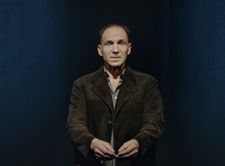 |
| Sophie Fiennes on filming Four Quartets: “I created a language for each one …” |
A lot of people have very strong senses of the poem for themselves. It’s very much his inhabiting of it. But I definitely think he wants to tease out whatever it was meaning and what he thought. He does a lot of work for us. His need to make a kind of a thread. He weaves a thread with it.
AKT: I talked with Ralph about nine years ago at a dinner at Le Cirque we were at for The Invisible Woman when he was playing Dickens and he had just done Coriolanus. Shakespeare, Dickens, now T.S. Eliot - he is in a way wrestling with the biggest names out there. Has that always been the case?
SF: I think that sense of the monumental works by, very often monumental men of course - he’d play male characters, let’s be honest. I think the 20th century and even going back to Dickens or Shakespeare - this idea of a singular voice, of a singular author that possibly has shifted now. Some of those ideas of male genius, this is what we’re talking about, have shifted.
In fact, I think great writers are kind of ungendered. If you’re Dickens and you write those female parts - I mean Miss Havisham or … it is a feat of the imagination and goes beyond your sex or your gender. As a girl, I have to say, as I am, I always thought Eliot was very neutral.
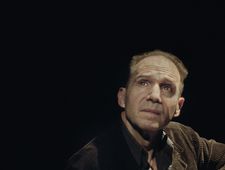 |
| Sophie Fiennes on Ralph Fiennes: “What he brings is his craft as an actor.” |
AKT: I agree, totally.
SF: It felt more open to a female mind to read.
AKT: We were talking about capturing something - maybe because of Žižek and your previous work - the “inertia of the Real” came to mind. There is the beautiful scene with the planes in the desert in The Pervert’s Guide To Ideology. That for the first time connected for me with TS Eliot. Do you see a connection?
SF: I definitely bring in the things that I learn from other films and that idea of materiality, that, as you say, inertia of the Real. And also in that sense that you can go back to the places and they’re still there. If you go at the time that Eliot talks about, of course the sun is still doing the same thing. In that sense it’s almost like psychogeography when you get to those places.
When I went to do a recce at Little Gidding, they said “Oh yes, here’s the pigsty,” and they’re looking at the things that are there and the wonderful cinematographer [Mike Eley] I was working with - and he didn’t really know the poem - he said “ the light hitting off this pool, this pond …”
AKT: Oh wow!
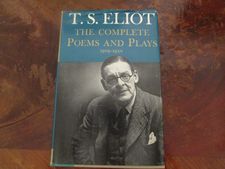 |
| T.S. Eliot The Complete Poems And Plays, collection Anne-Katrin Titze Photo: Anne-Katrin Titze |
SF: And I said “Oh, you found the pond?!”
AKT: So, this was going to be my next question, the locations of the titles of the Quartets are the locations you were filming?
SF: Absolutely! When you get there, everything is still there. And that’s really strange about time.
AKT: “And all is always now.”
SF: “And all is always now”! Yeah, those places are exactly as he writes them. And you see how forensic he was. He talks about the hawthorn bush that is covered with white in the snow. That’s there, the hawthorn bush. And the interesting thing about East Coker is that when I went to East Coker, I talked to the vicar in the church where actually Eliot’s ashes are interned in the church. I got chatting to the vicar and he said “Well, you know that Eliot stayed in West Coker because he had friends in West Coker, so he walked to East Coker because that’s where his relatives had come from.
And I retraced the old walking route, which is still actually pretty much the footpath. So when you do that you come across the grimpen, this muddy patch that he refers to, the bramble, even these quite small things seem to be there on the walking route from West Coker to East Coker. It was extraordinary to feel how present those places are.
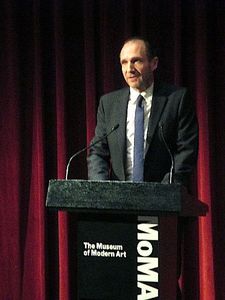 |
| Ralph Fiennes introducing The Invisible Woman at MoMA and reading an excerpt from Oliver Twist Photo: Anne-Katrin Titze |
AKT: And the fact that time didn’t touch them! That there is no shopping centre or something. It’s again that almost magical feeling that I get around TS Eliot.
SF: We went to Gloucester, Massachusetts and we actually stayed in the house Eliot’s father built in Eastern Point in Gloucester. We were in exactly those spaces that he is writing about in Dry Salvages, which is all written from where he grew up by the sea.
AKT: It’s fascinating. I only recently found out that I have ancestors who had emigrated to Missouri.
SF: Oh really! Like in the 19th century?
AKT: Yes, in the 19th century and they founded a county, Henry County. And suddenly there is an extra connection to Eliot who was born in Missouri. The Earth becomes big and small at the same time, like a ball that is tossed in the air sometimes.
SF: He loved landscape, Eliot. He wrote a lot about landscape and it was very personal to him. I don’t now if you know his landscape poems? There’s one called Usk.
AKT: Yes.
SF: And Usk is in Monmouthshire in Wales. I’ve got relatives who live slightly near there, so everything he talks about how the roads gently dip but not too deep. It’s around the river Usk that he writes that poem. He is a very attentive watcher of landscape.
AKT: The idea of the beginning being the end, the idea of rebirth is so prominent in Eliot. Speaking to you, I think I remember in your Grace Jones film that she says something in connection to her father’s death that watching a death is at the same time watching a birth.
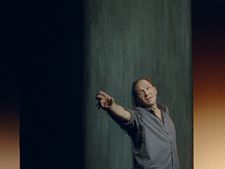 |
| Sophie Fiennes: “Yeah, there is a Beckettian feeling to it in the way that he staged it.” |
SF: Yes, exactly. And in fact that landscape she returns to at the end, when I filmed all that footage I always knew that was the end, this patch of land that she wants to reclaim at the end of the film. When she’s referring to her father dying and her granddaughter being born. Yes, I think that landscape is a place a bit like poetry where we deposit parts of ourselves.
And then when we go there, those memories become activated. By revisiting landscapes. And it’s the same with films. When you revisit a film that you saw at a certain age, you meet yourself again and you sort of measure how you’ve changed.
AKT: Can you give me an example of a film you revisited where that happened to you?
SF: Certainly Tarkovsky’s Stalker that I saw when I was about 18, 19 and then I saw again ten years later. And I had vivid memories of that sense of discovering it. Any of those films - The 400 Blows, the Truffaut film, I remember that made a huge impression on me. So I can go back and see that film and encounter myself as having changed actually.
It’s the time lost that I think is poignant in Four Quartets. It’s that sense that life is that series of moments and it’s a melancholic poem in that sense. All there is are these intense encounters and moments that are like shards, like fragments that we carry with us.
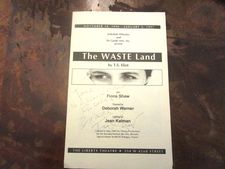 |
| The Waste Land programme signed by Fiona Shaw, collection Ed Bahlman Photo: Anne-Katrin Titze |
AKT: Some can be regained, others cannot, and it is beyond our control somewhat. The staging of Four Quartets was your brother’s? You didn’t change anything, his dance for instance?
SF: No, absolutely not. It was very important that we filmed it immediately after he’d done this five-week run in London, so it was really in his body. Because I think he developed physically as a stage actor in that show and I think he really enjoyed that. But I was having conversations with him from the early ideas of his doing it.
And I went to a rehearsal before it was on stage and I went to the dress rehearsal and he would ring me up and start reading bits on the phone and we would discuss them before he put it on the stage. It was through those conversations that I said when I saw it; “Let’s make a film of it!”
AKT: It works beautifully.
SF: Oh thank you.
AKT: I saw Ralph on stage in Beckett’s First Love in New York in 2008, something like that.
SF: Did he do that in New York? I remember seeing it. I didn’t know he was doing it, I’d forgotten that.
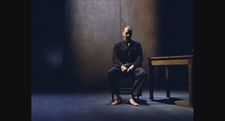 |
| Sophie Fiennes: “It’s the time lost that I think is poignant in Four Quartets.” |
AKT: It was at Lincoln Center, Michael Colgan, Gate Theatre. And I was reminded of that at moments. The forlornness.
SF: Yeah, there is a Beckettian feeling to it in the way that he staged it, I think. It was very interesting though that the person who controls the Eliot estate said that apparently Eliot was completely nonplussed by Beckett and didn’t understand what on earth that was. It’s like someone from the future, from beyond. He was slightly nonplussed by Beckett, Eliot apparently.
AKT: “For last year’s words ….
SF: … belong to last year’s language”!
AKT & SF in unison: “And next year’s words await another voice.”
SF: I mean I love all the language and I love how Ralph does that.
AKT: I do too, it’s beautiful!
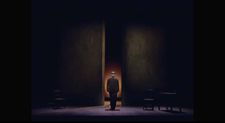 |
| Sophie Fiennes: “All there is are these intense encounters and moments that are like shards, like fragments that we carry with us.” |
SF: We filmed it in three days and what I did was I devised a way of filming it. Helen Gardner, she was a brilliant academic, English Literature. She did a very famous anthology of the Metaphysical poets like John Donne, Andrew Marvell, this period of Elizabethan poetry. And I think that in a sense Four Quartets is his attempt to write a divine poem, a Metaphysical poem in the sense of those poets that he was influenced by.
And obviously, famously St. John of the Cross and these references that were for Eliot important. Helen Gardner wrote a book that I happened to have in my mother’s poetry books that I’ve kept. It’s an old, out-of-print edition, called The Art of T.S. Eliot and in that there’s a chapter in which she really breaks down in an old-fashioned way the structure of the Four Quartets. I read that and I used that to think about proximities of the camera.
AKT: Great idea!
SF: So where it was pastoral it was wider, where it was urban, it was closer, more like a domestic space. And then with the lyric passages, they were portraits, they were closer. Then for this, what she calls the flat speech, which is digressions that aren’t driving, that are Metaphysical passages.
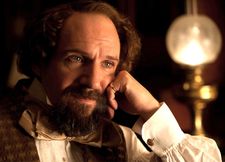 |
| Ralph Fiennes as Charles Dickens in The Invisible Woman |
I had a more open, fluid, moving camera. Because each Quartet repeats these different elements in it. So I created a language for each one that would then recur to try to respond to the idea of a musical structure or a formal structure that he was working with. I very much shot it in relationship to the different changes within the poem itself.
AKT: I noticed that somewhere near “And what the dead had no speech for, when living,/They can tell you, being dead” you have an extreme closeup.
SF: It’s actually “Ash on an old man’s sleeve/Is all the ash the burnt roses leave.” Because that’s the rhyming bit that follows that. Exactly! And the other one is the one with the clock in Burnt Norton. For all of those moments, without it being too heavy-handed - but that is an example, yeah. I didn’t want it to be like a closeup, I wanted to break away from the language of wides, mediums and closeups as a sort of generic capturing of a performance, but to really construct something that was rooted in the structure of the poem and then having all these beautiful light transitions on film, this kind of breath within the lighting.
AKT: The change of clothing is also interesting, it’s subtle, not dramatic. Suddenly you realise a different jacket, an undershirt that isn’t there.
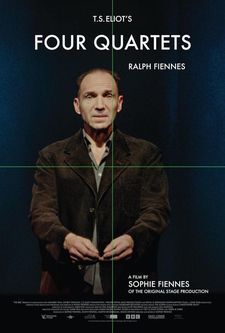 |
| T.S. Eliot's Four Quartets poster |
SF: That’s all blocked by Ralph in the show. And it’s very much that I didn’t want to change anything in the show at all. Because it was about making a documentation of it. But I have a particular interest in what is called cinematic staging. Which is how do you bring three-dimensional space into the two-dimensional image? It’s a grammar that actually was really evolved in the mid-20th century, in the Fifties.
Particularly in Hollywood, if you look at film noir, there’s a really particular cinematic grammar which is all about space. But then since film became more kinetic and more driven by sound and punctuations. I feel there’s an aspect to cinematography which is about space and that of course in the theatre it’s a given that you have the space. But the thing that Ralph does brilliantly is the distribution in the space of the ideas. How he places them.
AKT: Totally.
SF: That’s crucial, because everything is spatially set in where he sees it, so we see him see it. So that was very important not to interfere with what he’s doing in the space. Does that make sense?
AKT: It does. The hand stretched out on the wall, the moments in space make perfect exquisite sense.
Read what Sophie Fiennes had to say on Slavoj Žižek and The Pervert’s Guide To Utopias.
T.S. Eliot's Four Quartets opens at the IFC Center in New York on Friday, April 28.








